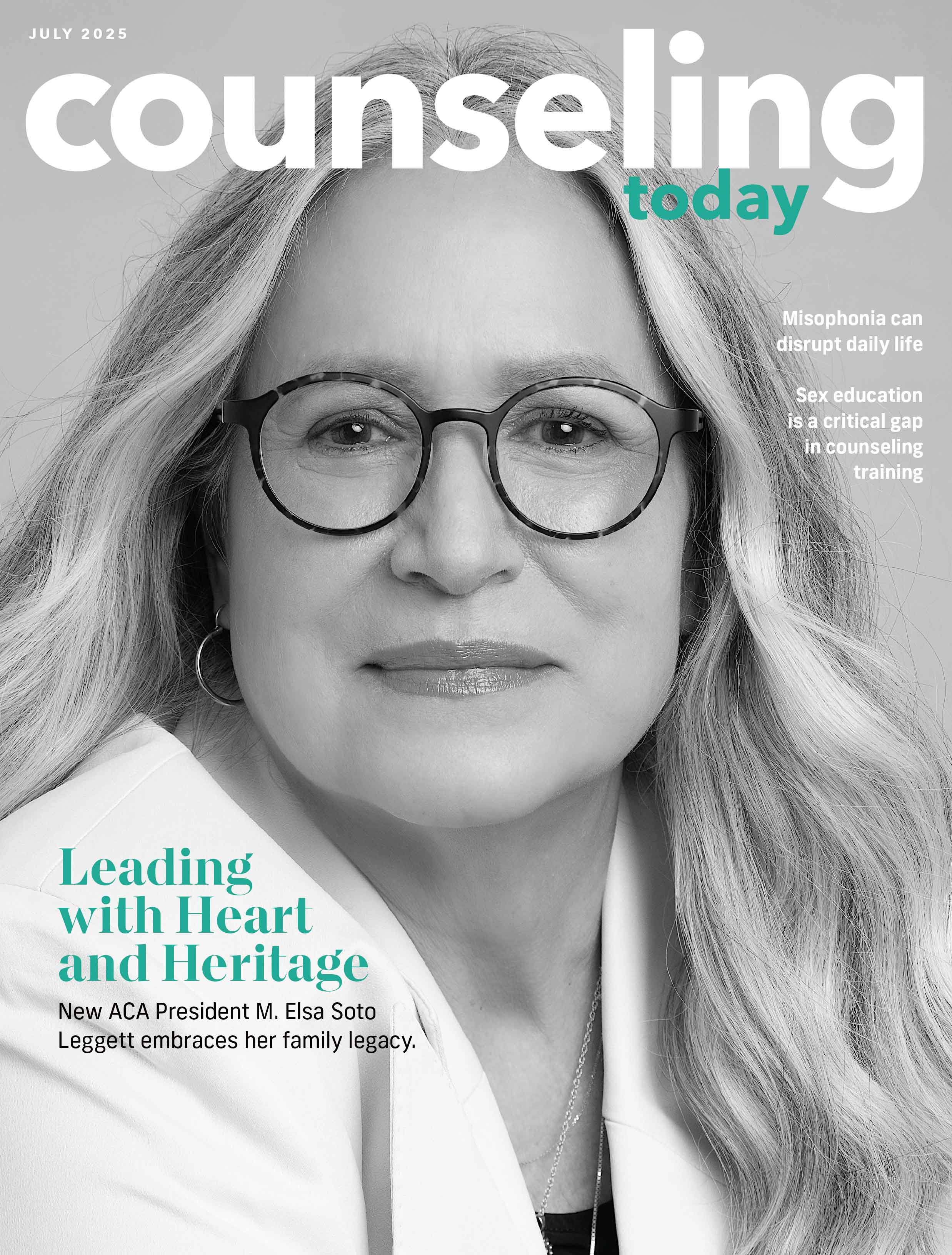Explore Counseling Today Articles
From the President: Recent decisions regarding ACA’s governance and leadership
Dec 4, 2023, 00:00 AM
Title :
From the President: Recent decisions regarding ACA’s governance and leadership
By line :
In this month’s column, I want to update you on the decision the Governing Council made regarding the ACA’s leadership and governance at its meeting this past June. Given that much misinformation has been circulating, I feel obligated to inform you of our actions as a responsible president with fiduciary responsibilities.
Here’s a little background to help you understand how we arrived at the decision to reorganize the council: When we hired a new chief executive officer — after more than 20 years with the previous one — we needed to assess how ACA was performing overall as an association, which included looking at the governance, finances, strategy and health of the organization moving forward. During my predecessor’s term, it was determined that we needed the necessary data to guide our present and future decisions. Thus, ACA hired a consulting firm to assess the association’s performance.
Let’s first focus on governance, which includes everything from finances to membership. The consulting firm provided Governing Council members with data from the assessment, and the findings indicated that although ACA’s performance is average, it is not as healthy as we would like it to be to help us progress and have a positive, bright outcome in the future. The assessment also revealed that one area where we could make improvements is the Governing Council itself, as it should be more efficient. Although the board is not necessarily toxic, it is not helpful either.
Based on this recommendation, the board members began making improvements, starting with approving the council’s restructuring. Please note that I am purposely using the term “restructuring” because this change will be a reorganization of the council, not a dismantling of it.
The Governing Council met for two days to engage in a strategy planning session during our September meeting to facilitate this restructuring. The board worked hard to create a vision and mission for ACA and develop a framework for our strategic plan. Every Governing Council leader who was present in person and via Zoom provided an excellent blueprint to be worked out in more detail by ACA staff.
In addition, the Governing Council still abides by the 2015 board’s decision to continue supporting the Council for Accreditation of Counseling and Related Educational Programs (CACREP). Therefore, the restructuring of the Governing Council does not pertain to our relationship with CACREP. I hope this information provides grounds for the changes we are undertaking as an organization.
This leads me to leadership. We must recognize that leadership, governance and action are intricately interconnected elements. Leadership is also pivotal in setting the vision, direction and values guiding governance and action. We can infer that influential leaders inspire and influence governance structures. Action manifests these principles in practice, where individuals, teams or institutions execute plans and decisions to achieve common goals. The strength of this triad lies in the symbiotic relationship among them: As leadership shapes governance, governance facilitates effective action, and successful action in turn reaffirms and refines leadership and governance practices.
During one of my recent visits to a state association, I was asked how I define leadership. As I reflected on the answer, I revisited my ideas and experiences about leadership, and I pondered on the definition and implications of the concept. One of the most peculiar experiences I have had since I began my term as ACA president is the perception that everything is resolved via leadership, meaning that everyone seems to think they can be leaders without first understanding what it means to follow. In my experience as a non-commissioned officer in the U.S. Army, it is not only impossible but also almost presumptuous to assume this. I can lead without hesitation after spending 12 years on active duty in the Army. Still, I must be able to experience how it feels to follow someone, regardless of whether I believe the person in charge possesses the skills, experience or knowledge to lead the way I would.
People must also understand that leadership comes with complex expectations. It requires you to make tough decisions that are best for the organization — even if they don’t make everyone happy. Embracing change is difficult, but we can’t assume that what worked for ACA in the past will continue to sustain it going forward. Therefore, leadership requires being flexible and open to differing views, being willing to address challenges differently, using data to inform decisions and being future focused to best position the organization for success in a challenging environment. Without a robust governance structure that helps leadership be high-performing and establishes clear strategic priorities and a solid financial road map, we won’t be able to rise to the occasion to address the mental health crisis in this country while also advocating for counselors and our profession.
I do not want to end this column without letting everyone know that I have been in conversations with other mental health organizations in the United States and abroad about possible collaborations to move advocacy forward and support and expand our work toward diversity, equity and inclusion. In turn, these collaborations will encourage dialogue about difficult conversations and further the decolonization of mental health.
Department :
From the President
Categories :
- Business Administration
- Professional Counseling
Tags :
audiences :
Contributors
Search CT Articles
Filter CT Articles
Current Issue
Sign Up for Updates
Keep up to date on the latest in counseling practice. Sign up to receive email updates from Counseling Today.



